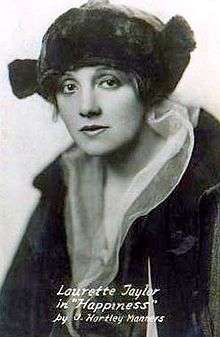Happiness (1924 film)
Happiness is a 1924 American silent comedy film directed by King Vidor, and starring stage actress Laurette Taylor in one of her rare film appearances. The film is based on the 1914 Broadway play of the same name written by Taylor's husband J. Hartley Manners.[1][2] This film is preserved at George Eastman House and Gosfilmofond (Russian State archives) Moscow.[3]
| Happiness | |
|---|---|
 Laurette Taylor in the Broadway production of Happiness (1914) | |
| Directed by | King Vidor |
| Screenplay by | J. Hartley Manners |
| Based on | Happiness by J. Hartley Manners |
| Starring | Laurette Taylor |
| Cinematography | Chester A. Lyons |
Production company | |
| Distributed by | Metro Pictures |
Release date |
|
Running time | 76 minutes ; 8 reels |
| Country | United States |
| Language | Silent |
Cast
- Laurette Taylor as Jenny Wray
- Pat O'Malley as Fermoy MacDonough
- Hedda Hopper as Mrs. Chrystal Pole
- Cyril Chadwick as Philip Chandos
- Edith Yorke as Mrs. Wreay
- Patterson Dial as Sallie Perkins
- Joan Standing as Jenny
- Lawrence Grant as Mr. Rosselstein
- Charlotte Mineau as Head Saleslady
Production
Happiness marked the second and final cinematic collaboration between Vidor and well-known stage actress Laurette Taylor. Based on the one-act play of the same name by Taylor's husband J. Hartley Manners the film adaption was a box office success, due in part to Vidor's personal interest in the theme and Taylor's, restrained performance [4]
Taylor would make one more movie with M-G-M studios in 1924, One Night in Rome, directed by Clarence Badger.[5]
Theme
Manners' vehicle for Laurette Taylor is largely a facsimile of his 1912 play Peg o' My Heart, with the setting moved from rural British Isles to the urban New York City.
The film version introduces a new facet to Manners' "creaky" scenario. Vidor's identification with the Populist movement and its pro-agrarian and pro-nativist ideals is enlarged in Happiness to include a broader spectrum of the working class, including poor and urban immigrants. The entrepreneurial Jenny (Taylor) struggles in this Brooklyn lower-class milieu to ultimately achieve social and financial security. Vidor makes explicit his political philosophy when the now successful Jenny encounters her early alter-ego, a poor, but ambitious girl (also named Jenny) on the streets of Brooklyn, with the inter-title "And the endless chain of Jennys goes on in all big cities..."[6]
Footnotes
- "Progressive Silent Film List: Happiness". Silent Era. Retrieved June 26, 2010.
- League, The Broadway. "Happiness – Broadway Show – Play - IBDB". ibdb.com. Retrieved November 10, 2017.
- "Happiness". lcweb2.loc.gov. November 10, 2017. Retrieved November 10, 2017.
- Baxter 1976, p. 17: "[in] Happiness [Taylor] adapted more comfortably to screen acting [than she had done in Peg o' My Heart in 1922]. Her [stage] mannerisms are subdued...Vidor's obvious sympathy for the film's message encouraged a personal approach."
Durgnat and Simmon 1988 p. 341: The play was first staged in the US in 1914. - Baxter 1976, p. 17
- Durgnat and Simmon 1988 : See section "The Rudiments of Vidor's Political Philosophy" p. 26-27 And p. 37: "Vidor's political populism, so tied to the support of the country world [grew] in to film populism, with its support of underdogs...everywhere [including] urban [pro-]labor proposals." (italics in original). See p. 37 for the "Jennys" encounter.
References
- Baxter, John. 1976. King Vidor. Simon & Schuster, Inc. Monarch Film Studies. LOC Card Number 75-23544.
- Brownlow, Kevin and Kobal, John. 1979. Hollywood: The Pioneers. Alfred A. Knopf Inc. A Borzoi Book, New York. ISBN 0-394-50851-3